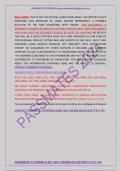PASSMATE TUTORIALS
DISCLAIMER: THIS IS NOT AN OFFICIAL GUIDE FROM UNISA. THE REPORT IS NOT
PREPARED NOR APPROVED BY UNISA, RATHER REPRESENTS A POSSIBLE
SOLUTION TO THE TASK CONSISTENT WITH THEORY. THIS ASSIGNMENT IS
INTENDED TO ASSIST STUDENTS IN GETTING STARTED WITH THEIR ASSIGNMENT,
AND IN NO CASE THIS DOCUMENT SHOULD BE USED FOR CHEATING. WE BELIEVE
THIS WILL BE A GOOD STARTING POINT AS IT WAS PREPARED BY OUR TEAM OF
PROFESSIONAL PRIVATE TUTORS WHO ARE EXPERTS IN THE FIELD, AND IT WAS
PREPARED USING VARIOUS SOURCES. ANY SIMILARITY WITH ANY EXISTING
THEORY OR DISCUSSION BY OTHER AUTHORS IS EXCUSED. THE AUTHORS
HOWEVER DO NOT CLAIM MONOPOLY TO KNOWLEDGE HENCE MODIFICATION OF
THE ANSWERS CONTAINED IN THIS FRAMEWORK MAY NOT BE PROHIBITED AS IT
CONTRIBUTES TO EXPANSION OF KNOWLEDGE. FOR ANY FURTHER GUIDELINE
ABOUT THE INFORMATION CONTAINED HERE AND THE MODULE IN GENERAL,
CONTACT PASSMATE TUTORIALS.
WE ASSIST WITH OTHER MODULES INCLUDING:
ECSs, FACs, MACs, MNGs, INTs, TRLs, HMEMS, PRMs, PROs, MNBs, DSC, QMI, MNMs,
MNO, MNPs, FIN, PUBs, MNMs, RESEARCH among others.
WE OFFER CLASSES, ASSIGNMENT GUIDELINES, EXAMINATION PREPARATION,
RESEARCH AND RESEARCH PROPOSALS, DISSERTATION EDITING etc.
OTHER THAN UNISA, WE ALSO ASSIST STUDENTS AT VARIOUS INSTITUTIONS
INCLUDING MANCOSA, REGENT, REGEYNESES, BOSTON, STADIO, OLG, UJ, UP etc
For any enquiries the following numbers can be used for calling, sms, whatsapp and telegram
CONTACT PASSMATE TUTORIALS @061 262 1185/068 053 8213/0717 513 144
PASSMATE TUTORIALS 061 262 1185/068 053 8213/0717 513 144
, PASSMATE TUTORIALS
Please note, this document contains excessive information, please trim it to
reasonable size roughly 8 to 10 pages, you may no use everything
which is featured in this document
You are good to go!
TABLE OF CONTENTS
TABLE OF CONTENTS ............................................................................................. 2
Question 4.1 ............................................................................................................... 2
Question 4.2 ............................................................................................................... 5
Question 4.3 ............................................................................................................... 8
Question 4.4 ..............................................................................................................11
Question 4.5 ............................................................................................................. 15
REFERENCES ......................................................................................................... 23
Question 4.1
Defend the following statement:” When uncertainty drops to nearly zero, and
when effort is repeated a large number of times, the work is no longer
considered a project.” [Use - A topology of projects Figure 1.3 (page 5) in the
prescribed book. Do Not Draw the Figure!]. [20]
2
PASSMATE TUTORIALS 061 262 1185/068 053 8213/0717 513 144
, PASSMATE TUTORIALS
The statement, "When uncertainty drops to nearly zero, and when effort is repeated a
large number of times, the work is no longer considered a project," reflects key
distinctions between projects and operational work. The defense of this statement can
be elaborated by highlighting the inherent characteristics of projects and contrasting
them with operational activities. This formulates the discussion that follows.
Characteristics of Operational Work
Operational work involves ongoing, repetitive processes that are part of the
organization’s routine activities. Examples include manufacturing, customer service,
and maintenance. Driscoll, Parnell, and Henderson (2022) highlighted that operational
activities are highly predictable with established procedures and minimal uncertainty.
They are performed regularly and have well-defined outputs.
Repetition and Standardization
When an activity is first undertaken as a project, it involves significant planning,
experimentation, and refinement. This phase is characterized by high uncertainty and
a focus on delivering unique outcomes. As the activity becomes well-understood and
processes are standardized, the level of uncertainty diminishes. When the activity can
be performed repeatedly with predictable results, it transitions from a project to an
operational process.
Definition of a Project
According to the Project Management Institute (PMI), a project is a temporary
endeavour undertaken to create a unique product, service, or result. The uniqueness
and temporary nature are crucial defining characteristics. Projects typically involve a
significant level of uncertainty and risk because they aim to produce something new
3
PASSMATE TUTORIALS 061 262 1185/068 053 8213/0717 513 144




